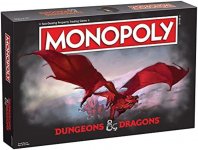TheSword
Warhammer Fantasy Imperial Plenipotentiary
I think you misunderstand what a monopoly is. Dominating the market by being more profitable and popular than the competition isn’t a monopoly. A monopoly controls supply and prevents competition.No, but MacDonalds being the only profitable fastfood resturant would have been a monopoly?
Wizards establishing an exclusive platform for D&D play would not in itself constitute a monopoly - and noone has claimed so. What might cause this to be a move toward monopoly is if this makes the other existing commercial VTTs no longer economically viable - hence making them disappear.
Wizards developing their own platform for their own game wouldn’t do this. Only if Wizards controlled the only means by which people could stream TTRPG or play online would it. And then only if other companies weren’t capable of developing their own platforms.
Train operators run monopolies because it’s the only way you can get from X to Y is by taking their trains and using their tickets. Water companies can have monopolies because if I want my water in the midlands I have to use Severn Trent Water Comapny. MacDonalds isn’t a monopoly though, neither is WotC.



